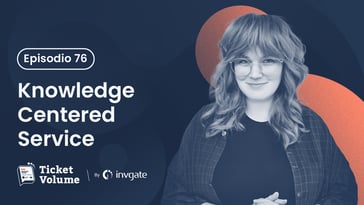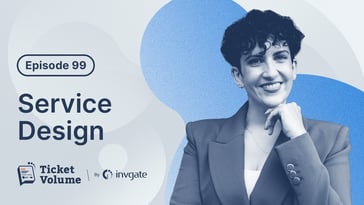In the fast-paced world of IT, staying up-to-date and relevant is a never-ending task. But fear not, because we've got ITIL author and ITSM expert Anthony Orr to guide us through the process.
On the 58th Episode of Ticket Volume, our IT podcast, he shared his top tips for staying informed and keeping your IT team ahead of the game. From his favorite channels for staying up-to-date to his recommendations for IT leaders, Anthony's insights are invaluable for anyone looking to stay on top of their game.
But that's not all. Anthony also gives us a sneak peek into what we can expect from ITIL 5, including the imperative importance of adopting a business focus. As the IT landscape continues to evolve, it's more important than ever to align IT with the needs and goals of the business.
With a career spanning over six years at HDI and experience working with big names like Honeywell, the Department of Veteran Affairs, and BMC Cherwell, Anthony knows his stuff. As a Solution Director for SDI Presence, he continues to drive innovation and excellence in ITSM, helping organizations stay ahead of the curve.
So, if you're looking to stay relevant and up-to-date in the world of IT, listen up. Make sure to tune in to the entire episode featuring Orr. And remember, you can sign up for our monthly live recordings and directly ask any questions during the session.

How to stay relevant in IT according to Anthony Orr
To stay relevant in IT, organizations need to adopt a strategic approach that goes beyond viewing ITSM tools as mere ticketing systems.
Orr, as an expert in the field, underscored the significance of continuous learning, actively staying abreast of industry trends, and attentively listening to others. It’s all about effectively connecting the dots, so IT leaders can provide innovative solutions and unwavering support to their organizations.
On that note, he shed light on the dynamic landscape of Service Management, where the focus has shifted towards achieving tangible business outcomes and recognizing the value of the Service Management office. He emphasized the criticality of embracing diverse perspectives and experiences to foster the development of best practices in ITSM.
Focus on people and collaboration
User experience and engagement emerge as pivotal factors in effective IT service management. Orr challenged the notion of perceiving ITSM tools merely as ticketing systems, emphasizing their potential to deliver strategic value to the business. He advocated for a collaborative approach, fostering a culture of education and empowerment to drive improvements in IT operations.
Hence, he championed the investment in people and the cultivation of a collaborative environment, which not only fulfills business needs but also enhances job satisfaction. Mentorship and compassion take center stage in both the education and business realms. Orr pointed out the limitations of education without the guidance of mentors or external consultants, which can result in prolonged journeys and diminished business value.
|
|
"Let's make sure that they can work together in a coordinated and collaborative way so that they can fulfill the needs of the business and even understand what they're really trying to accomplish. Instead of coming to work and being compliant, they become more compassionate about what they're doing. It's all they told me to do this, I just do this and everything else. But to be compassionate, you're going to be on top of what you need to do. You're looking for opportunities always for improvement, automation, and everything else. And you either get a better sense or feel about what your job is within the organization." Anthony Orr |
Furthermore, Orr explored the augmenting role of emerging technologies such as AI, which, when integrated thoughtfully, can automate mundane tasks and enable individuals to contribute more strategically to the organization.
Design a templated process
Orr anticipates the future evolution of ITIL, envisioning a convergence of best practices and the inclusion of practitioner templates. Creating a templated process is essential for organizations to have a structured approach to their work. This process should be easily implementable by individuals or organizations, providing a standardized way of doing things while allowing customization for specific needs. It establishes a common language and understanding among team members, enhancing efficiency and productivity.
Orr placed significant emphasis on the service catalog and the integration of different versions of ITIL. By engaging in meaningful conversations with customers regarding their service capabilities, organizations can optimize productivity and deliver exceptional service. The service catalog serves as a vital tool for comprehending the value of services and products provided.
Emphasize business outcomes
To stay relevant in IT, organizations must place a stronger emphasis on business outcomes. The industry has been increasingly discussing the importance of aligning IT initiatives with overall business goals. The next version of the templated process should address this aspect, making it even more valuable for organizations. ITIL certification helps establish a common language and understanding among professionals, while templates provide guidance on designing various processes.
Orr sheds light on the dynamic landscape of service management, where the focus has shifted towards achieving tangible business outcomes and recognizing the value of the service management office. He emphasizes the criticality of embracing diverse perspectives and experiences to foster the development of best practices in IT service management.
Recognize the value of service management offices
The establishment of Service Management Offices (SMOs) emerges as a crucial component in aligning IT services with overarching business objectives. They bridge the gap between services and overall business objectives, bringing business relevance to various activities and processes. Although SMOs may have fallen out of recent conversations, their value remains significant in ensuring the alignment of IT services with business goals.
|
|
"You know, the service management work office leads the PMO. But the PMO is almost trying to lead the service management office today. At the end of the day, there are other entities that should be connected the right way, and so forth. But to me, that's still important because, as we started, I talked about what service management is and how IT service management supports that. So that's what the organization does. The service management office can help bring more business relevance to all those things that we're doing underneath." Anthony Orr |
Our guest explored the seamless relationship between best practices and ISO4. As the next version of ISO4 incorporates more best practices, organizations are encouraged to align their operations accordingly.
Advice for IT leaders
For individuals aspiring to IT leadership roles, staying relevant requires continuous education and understanding of their organization. Leaders should have a high-level understanding of their team's work without getting lost in the details. Strategy should be a priority, not an afterthought. Seeking advisory help and assessments can help leaders understand constraints and possibilities, enabling them to make informed decisions.
Orr also encouraged IT leaders to prioritize user experience and engagement, foster collaboration and education, and invest in the growth and development of their teams.
In a nutshell, it’s indispensable to focus on the nature of continuous learning, staying updated with industry trends, and actively engaging with others to remain relevant in IT leadership.
Bottom line
This is just a summary of Ticket Volume's episode featuring Anthony Orr. Be sure to listen to the full discussion with Matt Beran to learn more about how to stay relevant in IT.
You can find the full episode on popular platforms like Apple Podcasts, Spotify, YouTube, or any other podcast platform you prefer. Remember to subscribe if you're interested in joining the monthly live recordings!















